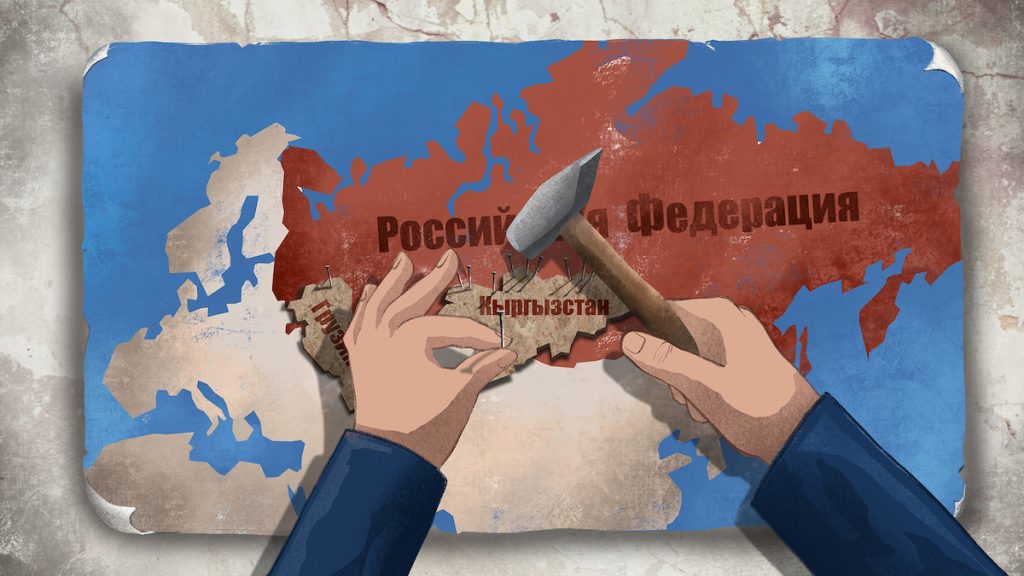Nailed to Russia: How Kyrgyz and Georgians are forced into foreign policy choices
“Foreign agents” law in Kyrgyzstan and Georgia

Reaction to the adoption of the pro-Russian “foreign agent law” in Kyrgyzstan and Georgia varied dramatically. The response from their foreign policy partners also differed significantly. However, there is a common thread: with this law, the authorities of both countries have placed their citizens before a choice that not everyone finds agreeable.
JAMnews shares an article from its partner, the Kyrgyzstani publication Kloop.
Kyrgyzstan and Georgia passed their so-called “foreign agent” laws within two months of each other. In Kyrgyzstan, it’s called the “law on foreign representatives,” while in Georgia, it’s titled “on transparency of foreign influence.”
Despite the different names, the essence is the same: both states are increasing control over the non-governmental sector.
The new law in Kyrgyzstan requires NGOs to register as “foreign representatives,” whereas in Georgia, they must register as “organizations working in the interest of a foreign state.” Those who comply risk drowning in costly reporting requirements, while those who don’t face hefty fines and the dissolution of their NGOs.
Critics in both countries have noted that the law is identical to Russia’s “foreign agent” law. As of early March, the number of “foreign agents” in Russia stood at 579 individuals, legal entities, media, and non-profit organizations.
This list is updated weekly with new names, including well-known artists, singers, writers, and journalists. In Russia, “foreign agents” are prohibited from participating in politics, environmental activities, and public procurement, holding public office, conducting anti-corruption reviews of legal acts, organizing public events, teaching schoolchildren, maintaining simplified accounting, and advertising. The law is continually being tightened; recently, for example, “foreign agents” were banned from participating in elections.
Kyrgyzstan and Georgia don’t have such restrictions yet, but human rights activists believe it’s only a matter of time; 12 years ago, the Russian law was also more lenient when first introduced. Nevertheless, the public’s reaction to the “foreign agent” law in these two countries has been very different.
“This is wrong, ungrateful, it hinders our prospects”
After the “law on transparency of foreign influence” was passed in Tbilisi, daily mass protests took place in front of the parliament and marches through the central streets for a month. On July 15, president Salome Zourabichvili filed a lawsuit against the law in the Constitutional Court. Before this, she had vetoed the document, but the Georgian parliament overrode it. The fight against the law continues.
“This law has deeply polarized Georgian society, with a divide based on generational differences. The youth mostly support Georgia’s European course,” explains Georgian diplomat and politician Valeri Chechelashvili.
At the end of last year, the Council of the European Union granted Georgia official candidate status for EU membership. Since April 2017, Georgian citizens have been able to enter EU countries without visas. This greatly inspired Georgians, giving them a sense of prospects and a vision for the future.

“Georgia owes much of its success to the consistent support from our strategic partners, who have provided hundreds of millions of dollars annually,” explains Chechelashvili. “95-97 percent of this aid goes into the state budget and government programs, not to NGOs.
For instance, the U.S. government funded a hepatitis treatment program in Georgia, which amounted to hundreds of millions of dollars. As a result, even Armenian citizens were obtaining Georgian citizenship to benefit from this program.”
A vivid example of international donor assistance, according to the diplomat, is the coastal city of Batumi, which has been attracting investors and tourists from abroad for the past 15 years.
“Everyone admires Batumi, its skyscrapers, and modern infrastructure,” he says. “But few know that Batumi had fundamental water supply issues — water couldn’t reach above the third or fourth floors because of low pressure and outdated systems. German funds financed the repairs, partly through grants and partly through low-interest loans, rehabilitating Batumi’s entire water supply system. Now, even in 40-story skyscrapers, there are no water supply problems.”
In this context, equating the influence of Georgia’s international partners to subversive activities is “very wrong, ungrateful, and hinders our prospects,” the politician believes.
“As a result, our movement towards the European Union is complicated. With the adoption of this law and several other laws, we are not moving towards EU membership but away from it. This means we could lose what we have already achieved.
Our main achievements include visa-free travel with the EU, candidate status for EU membership, and free trade. Additionally, Article 78 of Georgia’s constitution states that we must strive towards the European Union,” Chechelashvili notes with regret.
Currently, supporters of Georgia’s European future and its EU partners are looking towards the upcoming parliamentary elections in the fall. If the ruling party, Georgian Dream, led by oligarch Bidzina Ivanishvili, wins, the country might pivot towards Russia, and the youth, fearing the loss of visa-free travel to Europe, might start leaving en masse. If the pro-European integration supporters win, repressive anti-democratic laws will be repealed.
“In Kyrgyzstan, the issue of European integration is not on the agenda”
In Kyrgyzstan, the reaction to the “foreign representatives” law was quite different. Only NGOs, some deputies and public figures, certain media outlets, and social media users protested against it. According to political scientist Emil Dzhuraev, the different reactions from citizens of the two countries are due to the varying development prospects for their countries and societies.

“In Kyrgyzstan, the issue of European integration is not on the agenda at all,” Dzhuraev reminds. “Georgian society has a much deeper understanding of the value of democracy and the freedom of public associations. In Kyrgyzstan, although we called ourselves an ‘island of democracy’ and felt like the freest society in the region, the commitment to these values remained superficial among the general population. Persistent propaganda efforts by the authorities over many years to discredit civil society institutions, freedom of speech, and free media have played a significant role. Among the broader public, there is deep uncertainty and apprehension about these institutions.”
In Georgia, civil society is not just “a dozen organizations criticizing the government,” but the entire society, says Dzhuraev. A Georgian citizen sees themselves not as a passive observer but as a member of this civil society. The political scientist attributes this unfavorable comparison not only to the Kyrgyz authorities, who have spent years discrediting human rights defenders and independent media, but also to the NGOs themselves.
“All advantages on the side of the state”
The reaction of non-governmental organizations in the two countries to repressive laws differs as well.
In Kyrgyzstan, there is no unity among NGOs. Some have been forced to accept the rules imposed by the authorities and are now preparing to register in the “foreign representatives” registry. Other NGOs continue to resist the new law and hope for its repeal, having filed a lawsuit in the Constitutional Court. Some NGOs are simply dissolving.
In contrast, Georgian NGOs have collectively declared their refusal to register as “agents of foreign influence,” as required by the “Law on Transparency of Foreign Influence.” They consider such registration “degrading.” A total of 126 NGOs have signed a statement to cease all forms of cooperation with the authorities.
Valery Chechelashvili, who also has his own NGO, stated that it will not voluntarily register and comply with the new law. However, this is a temporary tactic, as Georgia awaits the autumn elections, which will determine the country’s foreign policy direction.
“We understand that we will be forcibly registered and simultaneously fined 25,000 lari [about 8,300 euros],” he explains.
“We will not register, we will pay this fine, and we will continue our work. It is important for us to continue at least until the elections. The outcome of the elections will determine the fate of Georgia and the fate of NGOs. If the ‘Georgian Dream’ party, which initiated the ‘foreign agents’ law, remains in power, there will be no point in the activities of NGOs, because all the advantages will be on the side of the state. We have no checks and balances, such as an independent judiciary, and it will be very difficult for us to resist,” says the politician.
Some scolded, others punished
The reactions of official representatives of the European Union and the United States to the laws in Kyrgyzstan and Georgia have been notably different.
For instance, the signing of the “foreign agents” law by Kyrgyzstan’s president was termed merely as a “worrying development” by European officials, who noted that it “could negatively impact Kyrgyz society and its cooperation with international partners.” U.S. Secretary of State Antony Blinken gently urged president Japarov to repeal the law, but his comments were met with an unprecedentedly sharp rebuttal, questioning why Western nations can have certain freedoms while Kyrgyzstan cannot. No sanctions from the West followed.
The consequences for Georgia have been much more severe. “Unfortunately, Georgia’s accession process to the EU is currently stalled,” said EU Ambassador to Georgia Paweł Herczyński. “This decision was made by EU leaders at the latest European Council meeting.”
The EU has frozen 30 million euros from the European Peace Fund allocated for defense support to Georgia. Germany is also reassessing its relations with Georgia and is refraining from making new commitments under their bilateral cooperation. A major legal forum, which was held in Tbilisi last year and was set to take place in Berlin this summer, has been canceled.
The U.S. Department of Defense has canceled joint exercises “Noble Partner” with the Georgian army. Moreover, a month ago, the U.S. imposed sanctions on Georgia due to the “foreign agents” law. Visa restrictions have been applied to a dozen members of the “Georgian Dream” party, parliament deputies, and security officials responsible for the law’s enactment and the suppression of protests.
“This law nails us to Russia”
Emil Dzhuraev believes that the “foreign agents” laws force Kyrgyzstan and Georgia to choose between the West and Russia.
“Adopting [the law] automatically aligns us with one side, while rejecting it aligns us with the other. This is not very beneficial for either Kyrgyzstan or Georgia. However, there is a significant difference between our countries. Georgia is significantly closer to integration with Western countries and organizations, having received candidate status for EU membership, which is not anticipated for Kyrgyzstan,” the political scientist reflects.
This is partly explained by the differences between the South Caucasus and Central Asia, he notes, as these regions have different prospects and influential players.
“Kyrgyzstan has been under strong Russian influence for many years, especially in recent years. Despite our neutrality regarding the war in Ukraine, it is clear to both Western and other countries that we do not have much choice. Therefore, unlike Georgia, I do not think we will have any sharp turns to the right or left,” the expert contemplates.
Nevertheless, Kyrgyzstan, at least declaratively, has pursued a multi-vector foreign policy over the past 30 years. This provided the country with significant benefits: when you are not solely dependent on one or two key partners, it is harder for them to twist your arm.
Now, this policy is coming to an end, according to Dzhuraev. He predicts that financial support for civil society, political and legal reforms, and social development from Western donors, European countries, and the USA may decrease.
“Kyrgyzstan is losing not just money but the ability to pursue a multi-vector policy, which is very important for us,” he explains. “For Kyrgyzstan, like any other state, it is crucial to have diverse relationships that are at least somewhat substantial and balanced. This will be much harder to achieve with the adoption of the [‘foreign agents’] law. This law nails us to Russia.”



















